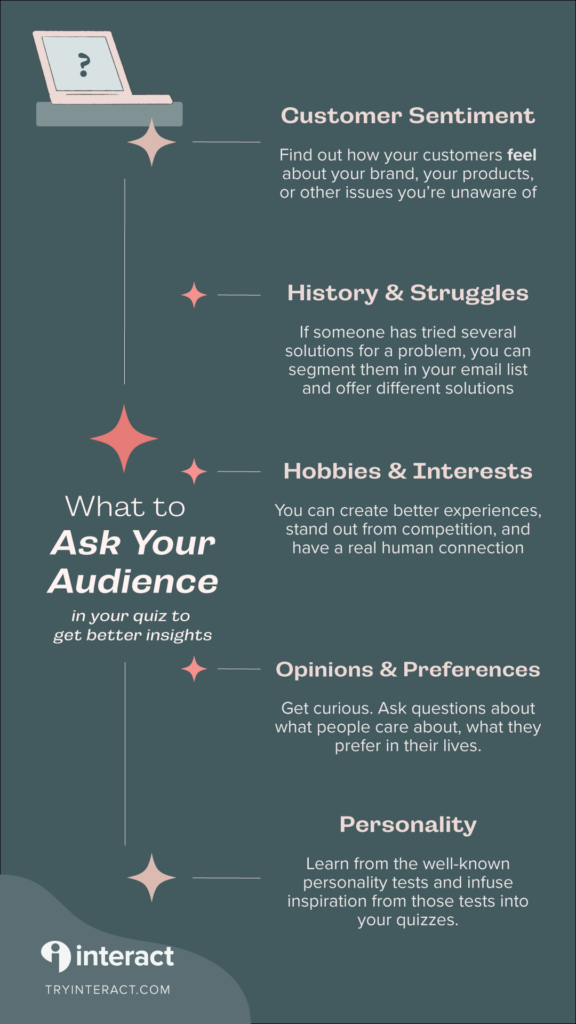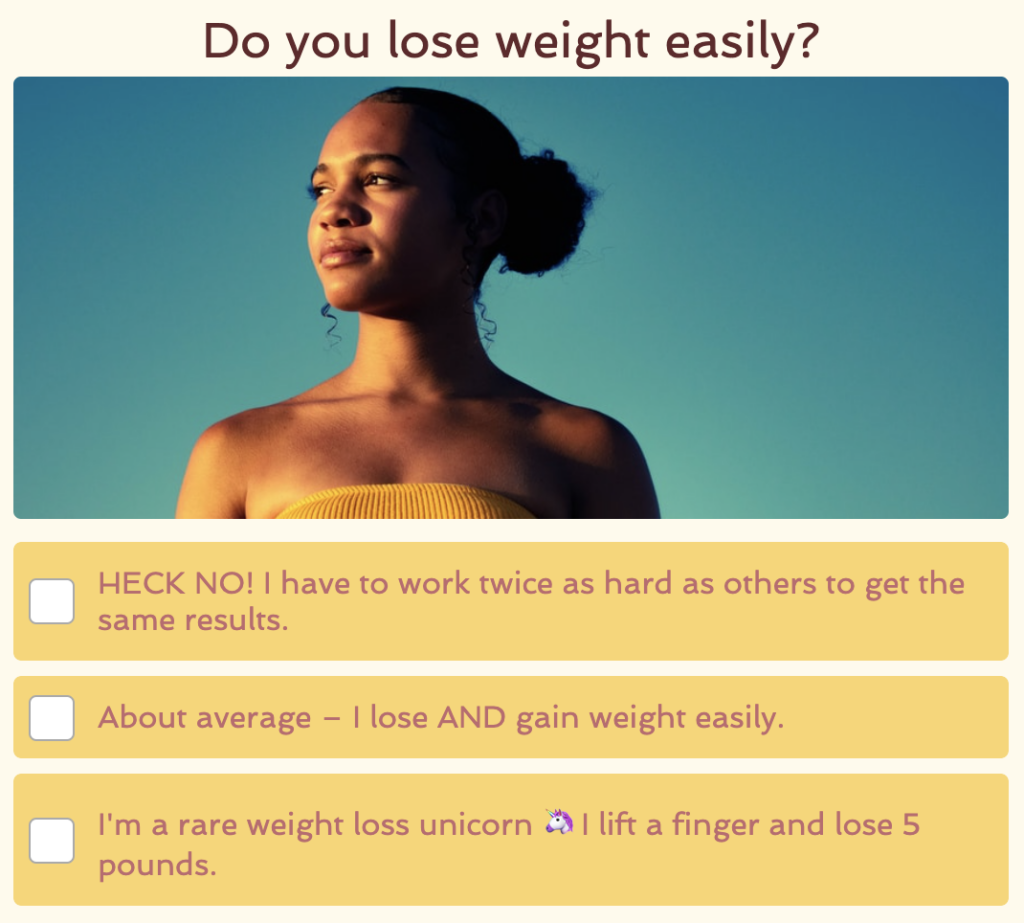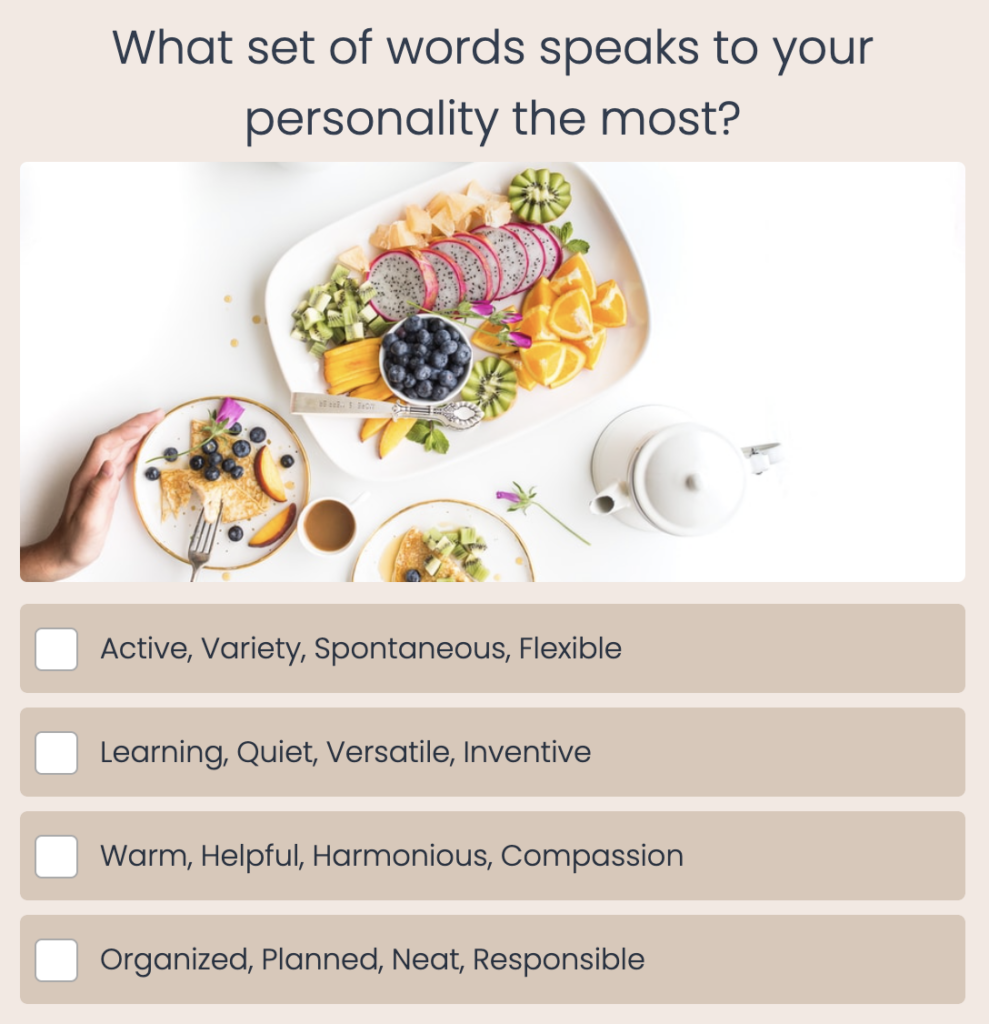Zero-party data is a new term that refers to information your customers willingly and actively give you. With all of the new privacy laws around tracking, plus the general benefits of zero-party data as a more reliable source of truth versus third-party tracking, it is super valuable to your business.

The obvious follow-up questions are, How do I build a quiz or other app so I can ask for zero-party data? And what questions should I even be asking?
These are good questions! Let’s get into the eight unique types of questions you can ask to bring in the zero-party data you’ll need to make marketing, product, and sales decisions that will lead to business growth.
Unique Types of Zero-Party Data You Can Ask for with a Quiz

These types of questions may not be what you’re used to seeing. The standard types of questions that tie back to demographic data—like age, location, and income—are all well and good. You can, of course, use a quiz to ask for demographic information. But today, we’re talking about the information that lives outside of demographics and easily identifiable information—the type of information you can only get with a quiz.
Customer Sentiment
If you know how your customers feel about your brand, your products, or issues outside of your immediate world, you’ll be able to improve on that baseline.
“If you can’t measure it, you can’t improve it.”—Peter Drucker
Without a quiz or survey, it’s really hard to measure customer sentiment. The difference between those two formats is that people want to engage with quizzes, but they usually need an incentive to fill out a survey. Think of a quiz as a survey mixed with your favorite entertainment.
Practical Tip: If you ask questions like “How do you feel about X?, you can gauge customer sentiment around any topic. Because your questions are personal and connecting, people will enjoy answering them.
History
Zero-party data, because it is asked for and not collected, can relate to any part of your customers’ lives, including the past. Think about the power of this. If you know someone has already tried several solutions for a problem, then you can make sure not to offer those same solutions by segmenting your email list, putting forth different potential solutions for those folks to try.
One of the biggest struggles in marketing is the inherently impersonal nature of most mediums. By asking people about their history so that they’ll provide you with information, both parties can enjoy a more personalized and enjoyable experience.
Practical Tip: Whatever your industry, endeavor to grow in understanding your customers’ history with the types of solutions you offer. This will point you in the right direction on where to put your focus moving forward.

Hobbies
Whether your business focuses on hobbies or not, think about how helpful it would be if you knew what your customers did outside of work. You could relate on so many more levels, it wouldn’t have to be all business all the time, and your content could be even more relevant to people’s actual lives.
Practical Tip: Think about how powerful it would be to know that 40% of your audience enjoys painting. You could use a painting metaphor to illustrate a point, for example. You would build instant credibility with your customers, and they would better understand the point you are making.
Interests
The possibilities are endless when you know what someone’s interests are. You can create content with limitless supply, build rapport, stand out from the competition, and have a real human connection with your customers instead of trading goods and services.
Have you ever had an experience where everything just seemed perfect? Maybe it’s your favorite restaurant, and they have just the right ambiance, the perfect glasses you love, all the dishes you enjoy; the whole setup seems built for you. You can create the same experience for your customers simply by knowing their interests.
Practical Tip: If you know what other people care about, you can help them achieve those things with precision.
“You can have everything in life you want by simply helping others get what they want” —Zig Ziglar
Opinions
Everyone has opinions, some stronger than others, and we make decisions based on them. Therefore, it’s important to know your potential customers’ opinions when you’re offering up your products or services. If you present a solution that’s vastly different from their views, you’ll face opposition instead of agreement.
Obviously, if opinions are hurtful to other people, discretion is needed. In general, though, when each opinion is as valid as the next, there’s value in helping people find what works for them.

Personality
Personality tests like Myers-Briggs, Enneagram, and Human Design are more popular than ever. For good reason, there is tremendous value in knowing your personality. It can help with everything from a career choice to relationships.
From a business perspective, you can align yourself with the personality types of your customers by knowing who they are and what types of personalities you tend to attract.
Practical Tip: Learn from the well-known personality tests and infuse inspiration from those tests into your quizzes. You’ll learn a tremendous amount about your audience.

Preferences
Do you have an audience that would rather be outdoors or curled up with a good book? If they like going on long hikes and all of the stories in your content are about reading by a fire, you’ll make it clear that you have no idea who you are selling to.
There is serious connecting power in knowing what people care about and weaving that into your work. From a buyer’s perspective, it feels good to know that the people you are giving money to for products or services actually know who you are and what you’re about.
Practical Tip: Get curious. Ask questions about what people care about, what they prefer in their lives. It will give you so much to talk about.
Struggles
We all want to solve problems that persist, struggles we can’t seem to get past. We spend inordinate amounts of time and energy trying not to get stuck.
Your business exists because it solves a problem for people—as all businesses do—and your opportunity is to know exactly what people struggle with the most and then meet those needs.
Practical Tip: Simply ask people what they are struggling with most right now. It’s an amazing way to open up a longer conversation, and it will give you ideas for how to craft your product and content.
Go Ask for Some Zero-Party Data!
It’s no longer enough to know the age of your audience and call it a day. People expect to be met where they are, understood, and spoken to as the human beings they are rather than a demographic study you conducted ten years ago.
Zero-Party data is powerful, it’s personal, it’s connecting. You can ask for it by building a quiz, so go out there and start learning!




